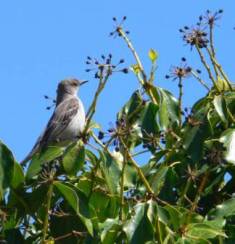
La página que intenta visitar sólo está disponible en inglés. ¡Disculpa!
The page you are about to visit is currently only available in English. Sorry!

 Mockingbird (Photo: U.S. Fish & Wildlife Services) |
I recently started receiving Google alerts for the word “bird.” Minus tidbits about racehorse Mine That Bird and various people with that somewhat unfortunate last name, the e-mails actually alert me to some pretty funny and interesting news. Here’s a sampling of avian intelligence from around the nation:
Florida: The mockingbird stands
Unhappy sharing their state bird, the mockingbird, with Arkansas, Mississippi, Tennessee and Texas, almost 30,000 Floridian school children—asked to vote by the state Fish and Wildlife Conservation Commission—have ousted the common backyard bird for the far more majestic osprey (over the great egret, the black skimmer, the snowy egret and the brown pelican), reported the St. Petersburg Times.
For the second time in a decade, however, an NRA lobbyist stands in the state’s way of making the change official. And it’s not because she’s fighting for her association; she simply likes the mockingbird. “You shouldn’t kick it to the curb just because it’s old,” Marion Hammer, the NRA lobbyist, told the Times. In 1999, Hammer led the campaign against changing Florida’s bird to the scrub jay—and won.
Virginia: Don't knock the vultures
Vultures have a bad reputation, one that Virginia Aquarium & Marine Science Center conservation education specialist Carol Ann Curran thinks is unfair. So last Saturday, she hosted a Vulture Appreciation Day at the aquarium, according to PilotOnline.com (The Virginian-Pilot’s web component).
Events included a visit with Cathartes, the resident three-year-old turkey vulture, as well as arts and crafts and—I couldn’t make this up if I tried—the mixing of fake vulture vomit that children then threw at pictures of the birds’ predators. Why? According to Curran, vultures throw up to ward off threats.
Texas: A sweet place to roost
Ten thousand chimney swifts have found a sweet place to sleep: The Imperial Sugar refinery in Sugar Land, TX (southwest of Houston), The Houston Chronicle reported. Apparently, the birds, which have been roosting inside an exhaust stack on a building known as the char house, had gone unnoticed until last week, when they were spotted by a resident.
Keeping this stack pristine and open—even after the birds migrate to South America in November—could have a twofold benefit: Provide a place for the swifts when they return to the area and become a tourist attraction for bird- and sugar-lovers.
Like hearing off-beat bird news? Send me an e-mail or let me know in the blog's comment section.